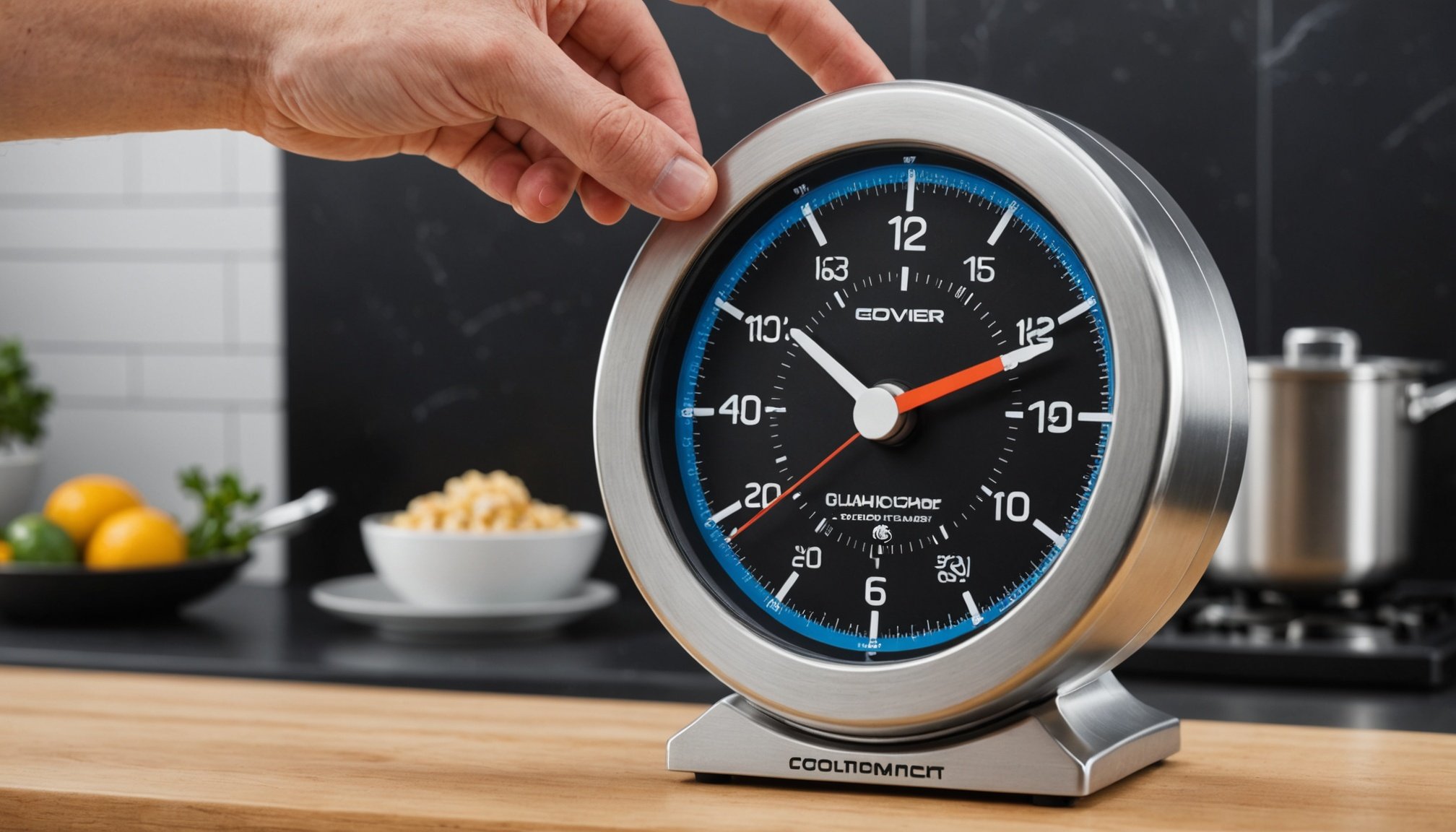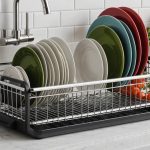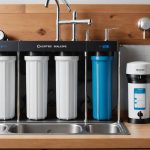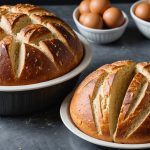Unlock Culinary Precision: The Ultimate Guide to Selecting the Ideal Kitchen Timer in the UK
When it comes to cooking, precision is key. Whether you’re a seasoned chef or a novice in the kitchen, having the right tools can make all the difference. One of the most essential kitchen tools that often gets overlooked is the humble kitchen timer. In this comprehensive guide, we’ll delve into the world of kitchen timers, helping you choose the best one for your culinary needs.
Understanding Your Needs: Types of Kitchen Timers
Before diving into the specifics, it’s crucial to understand the different types of kitchen timers available. Here are a few categories to consider:
Also read : Explore the Best UK Kitchen Composters for a Greener Home: Top Eco-Friendly Brands Unveiled
Mechanical Timers
Mechanical timers are the traditional and often nostalgic choice. They are simple, reliable, and do not require batteries or electricity. Here’s why you might prefer a mechanical timer:
- No Battery Worries: Mechanical timers are wound up manually and do not need batteries, making them a great option for those who prefer a low-tech solution.
- Ease of Use: They are straightforward to operate, with a simple dial to set the time.
- Cost-Effective: Generally cheaper than their electronic counterparts.
For example, the vintage SEB Cuisine 219 mechanical timer is a classic choice that still functions well today[4].
Also to read : The Ultimate Guide to the Best Under-Sink Water Filtration Solutions in the UK: Top Brands Revealed
Digital Timers
Digital timers offer more precision and additional features that mechanical timers cannot match.
- Precision Timing: Digital timers provide exact timing down to the second, which is crucial for recipes that require precise temperature control.
- Multiple Timers: Many digital timers allow you to set multiple timers simultaneously, perfect for cooking multiple dishes at once.
- Additional Features: Some digital timers come with features like countdowns, alarms, and even Bluetooth connectivity.
A good example of a digital timer is the Handheld Digital LCD Sports Stopwatch, which, although designed for sports, can also be used in the kitchen for its precise timing[1].
Smart Timers
Smart timers are the latest innovation in kitchen technology, integrating seamlessly with your smart devices.
- Voice Control: Many smart timers are compatible with voice assistants like Alexa or Google Assistant, allowing hands-free control.
- App Connectivity: You can control and monitor your timer from your smartphone or tablet.
- Customizable: Smart timers often come with customizable settings and recipes that you can save and reuse.
For instance, smart kitchen devices that integrate with smart home systems can offer a highly convenient and connected cooking experience.
Key Features to Consider
When selecting a kitchen timer, there are several key features you should consider to ensure you get the best product for your needs.
Ease of Use
- User Interface: Look for a timer with an intuitive interface. Digital timers with clear displays and simple button layouts are often the easiest to use.
- Voice Control: If you prefer hands-free operation, consider a smart timer with voice control capabilities.
Durability
- Materials: Timers made from stainless steel or high-quality plastics are more durable and easier to clean.
- Water Resistance: If you plan to use your timer near water or in humid environments, ensure it is water-resistant.
Additional Features
- Multiple Timers: The ability to set multiple timers can be incredibly useful when cooking complex meals.
- Alarm Volume: Ensure the alarm is loud enough to be heard from another room, especially if you have a larger kitchen.
- Countdown and Count-Up Functions: These features can be handy for various cooking tasks.
Here is a detailed list of features to consider:
- Precision Timing: Exact timing to the second.
- Multiple Timers: Ability to set multiple timers at once.
- Alarm Volume: Adjustable or sufficiently loud alarm.
- Countdown and Count-Up Functions: Versatile timing options.
- Voice Control: Compatibility with voice assistants.
- App Connectivity: Control and monitoring via smartphone or tablet.
- Durability: High-quality materials and water resistance.
- Ease of Cleaning: Easy clean design and materials.
Comparing Kitchen Timers: A Comprehensive Table
To help you make an informed decision, here is a comparative table of some popular kitchen timers:
| Product | Type | Precision Timing | Multiple Timers | Voice Control | App Connectivity | Durability | Ease of Cleaning |
|---|---|---|---|---|---|---|---|
| SEB Cuisine 219 | Mechanical | No | No | No | No | High | Easy |
| Handheld Digital LCD Sports Stopwatch | Digital | Yes | Yes | No | No | Medium | Easy |
| Smart Kitchen Timer by [Brand] | Smart | Yes | Yes | Yes | Yes | High | Easy Clean |
| Terraillon Minitimer | Digital | Yes | Yes | No | No | High | Easy Clean[2] |
Practical Insights and Actionable Advice
Choosing the Right Timer for Your Cooking Style
- For Gas Ovens: If you use a gas oven, a simple mechanical or digital timer might suffice, as gas ovens tend to maintain a consistent heat distribution.
- For Electric Ovens: Electric ovens can benefit from more precise digital or smart timers due to their precise temperature control.
- For Coffee and Small Meals: A compact digital timer is ideal for quick tasks like brewing coffee or cooking small meals.
Tips for Using Your Kitchen Timer Effectively
- Place It Strategically: Ensure your timer is in a visible and audible location to avoid missing the alarm.
- Clean Regularly: Keep your timer clean to maintain its functionality and hygiene.
- Use Multiple Timers: If your timer allows it, use multiple timers to manage different cooking tasks simultaneously.
Real-Life Examples and Anecdotes
The Importance of Precision
Imagine you’re cooking a delicate soufflé that requires precise timing to rise perfectly. A digital or smart timer can ensure you don’t overcook or undercook it, saving you from the disappointment of a failed dish.
The Convenience of Smart Timers
Sarah, a busy working mom, swears by her smart kitchen timer. She can set timers and monitor her cooking from her smartphone while taking care of her kids or working from home. This convenience has made her cooking routine much more manageable and stress-free.
Quotes from Experts and Home Cooks
- “A good kitchen timer is like having an extra pair of hands in the kitchen. It allows you to focus on other tasks while ensuring your food is cooked to perfection,” says Chef Emma, a culinary instructor.
- “I used to rely on my phone’s timer, but since switching to a dedicated kitchen timer, I’ve noticed a significant improvement in my cooking. It’s just more convenient and reliable,” says John, an avid home cook.
Selecting the ideal kitchen timer is not just about picking any timer; it’s about finding the one that aligns with your cooking style, needs, and preferences. Whether you opt for a traditional mechanical timer, a feature-rich digital timer, or a cutting-edge smart timer, the key is to ensure it enhances your culinary experience.
By considering the features outlined in this guide, you’ll be well on your way to unlocking culinary precision and making your cooking tasks easier, more efficient, and more enjoyable. Happy cooking








